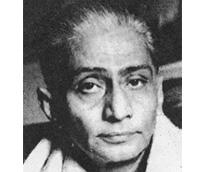BISHNU DEY
An introduction to Bishnu Dey's poetry
Bimal Guha/Aryanil Mukherjee
Bishnu Dey (1909-1982) although essentially a poet, was a versatile litterateur who dug his quill into prose, poetry-essays, cinema and art criticism. He taught English literature at several colleges in Kolkata, namely Ripon College, the prestigious Presidency College (1944-1947), Maulana Azad College (1947-1969) and Krishnanagar College. In the 1920s & 30s, he was an ubiquitous member of a young group of poets, centered around the Kallol (Commotion) magazine. The Kallol group represented a new classicist literary movement that stood opposed to Tagorian aura mainly in its import of the western  element of modernist doubt and conflict. He also co-edited the famous literary journal Parichay (Identity) with Sudhindranath Dutta. Later he also edited his own magazine Nirukta (Unspoken).
Bishnu Dey was a keen student of classical western art, literature and culture and imbibed heavily from it.
element of modernist doubt and conflict. He also co-edited the famous literary journal Parichay (Identity) with Sudhindranath Dutta. Later he also edited his own magazine Nirukta (Unspoken).
Bishnu Dey was a keen student of classical western art, literature and culture and imbibed heavily from it.
Some of his noteworthy books include –
• Urvashi O Artemis (Urvashi and Artemis) - 1933
• Chorabali (Quicksand) – 1937
• Sat Bhai Champa (Champa and her siblings) – 1944
• Ruchi O Pragati (Taste and Progress) -1946
• Sahityer Bhabisyat (The Future of Literature) - 1952
• Nam Rekhechhi Komal Gandhar (I’ll call you a Flat Note) -1953
• Rabindranath O Shilpa-Sahitye Adhunikatar Samasya (Rabindranath Tagore and the problems of Modern Art and Literature) -1966
• Michael, Rabindranath O Anyanya Yijnasa (Michael Madhusudan Dutt, Rabindranath tagore and other pursuits) -1967
• In the Sun and the Rain -1972
• Uttare Thako Mauna (Unresponsive) -1977
• Amar Hrdaye Bancho (Live in My Heart) -1981
Bishnu Dey was a difficult poet for the reader of his time. His poetry refers frequently to western classics (often art and music), attempts to marry eastern classical concepts with western, contrasting them at the same time. His poetry employed a rather sophisticated imagery that was rejected by some of his successors as “elitist”. He was also inspired by Marxist philosophy. He is said to have drawn sumptuously from T.S.Eliot. Many scholars have argued that Dey was far too advanced of his age, a great intellectual who was far too well read and versatile. His knowledge of music and art, both modern and antique, western and eastern, was deep rooted. He probably found a much greater audience towards the end of his creative life and beyond. Today, he is considered one of the foremost Bengali poets in post-Tagorian era.
Bishnu Dey’s fruitful collaboration with artist Jamini Roy led to his writing several books on art: Art of Jamini Roy (1988), The Paintings of Rabindranath Tagore (1958), India and Modern Art (1959), etc. He was also associated with Calcutta Group Centre, Soviet Friendship Association, Pragati Lekhak Shilpi Sangha, Indian People's Theatre Association (IPTA), etc.
Bishnu Dey was awarded the Sahitya Akademi Purashhkar (National Literature Academy Award -1966), the Nehru Smriti Purashhkar (Nehru Memorial Award -1967), and the Rastriya Jnanpith Award (1971). He also received the Soviet Land Award for Rushti Panchashati.
Poems :
Aspiration
Wipe out the sky tonight,
Smear darkness on the stars,
Blot out the moon in the slough of sleeplessness.
Cover your eyes and come
Through the web of the wind,
Drown the noise
Of the strides of the night-veiled sea
To take my breath away
At each of your soundless footfall.
In the quiet-quelled night
Let us meet mouth to mouth
Upon the summit of sleeplessness.
Shatter your world, scatter it in the sky,
And come to me in the dark.
Translated by the poet
The Alien
On either side the woods, in the middle the road
Gleamingly goes winding as nature beats the tune.
In the night-light, every now and then eyes glow,
young rabbits jump across dancing.
I have seen in the palasha bushes on rounded hillocks
Wild peacocks' Kathak in sudden joy,
By the shady tent on the golden sitar of the stream
I have counterpointed its grace.
They come in silence to the riverbank and lap their drink
I've heard the fawn-call of the Sindhumuni.
There goes the panther in greedy violent steps
Rousing the entire Kathakali temple of wild life
Where are the woods gone? Yet there are no settlements,
Only the bare plains, only the howl of the dry wind.
The jungles all cleared off, the villages dead, the critics
yet to be founded and the peacocks stuffed into commodities
Why in this land is man dumb and helpless?
Why are rivers, trees, hills so unimportant?
How long do we run about carrying our tents?
When does the alien set up his own home?
Translated by the poet
A Kafi
"Forests, trees, rocks and hills give me joy that my mind yearns for.
Each tree in the village speaks to me, it tells me, pure! complete!"
- Beethoven
My mind too, escapes in late spring
to the branches of mango and palash trees
and relaxes in contentment for a couple of hours
in the young green and middle-aged reds of fields,
after all, all men are debtors to the earth.
The afternoon, lost in a daydream
stares mutely in the distance,
it's in the past with no effort at all,
my distracted thoughts spin in the wind
and lose themselves in the call of doves
across deserted village rice-fields.
The evening, blushing with colours,
signs itself out on an exhilarating note,
in the deep tune of a song.
Do you know that I yearn for that song
just like a parched chatak begs for water?
Translated by Damini Dey
Translator’s Note –
Kafi is an Indian musical mode (raag). Chatak is a bird that has a
call that sounds like a cry for water in the summer. It is often
identified with the parched earth in Indian summers.
-----X-----
